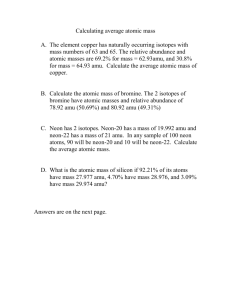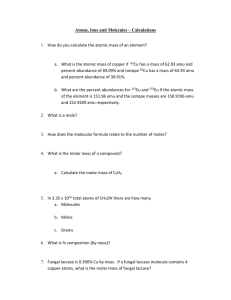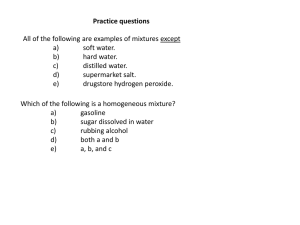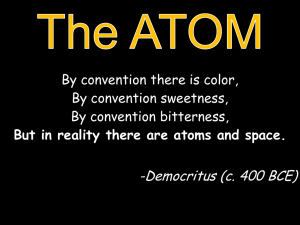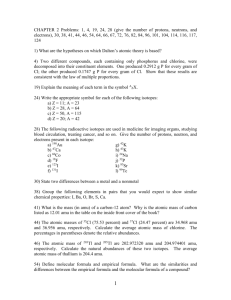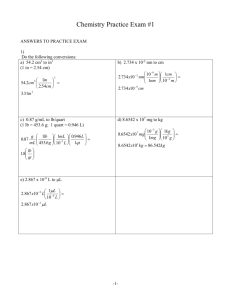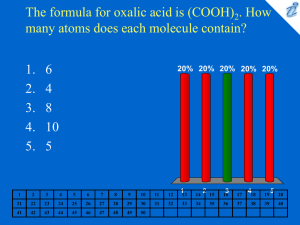sulfite system
advertisement
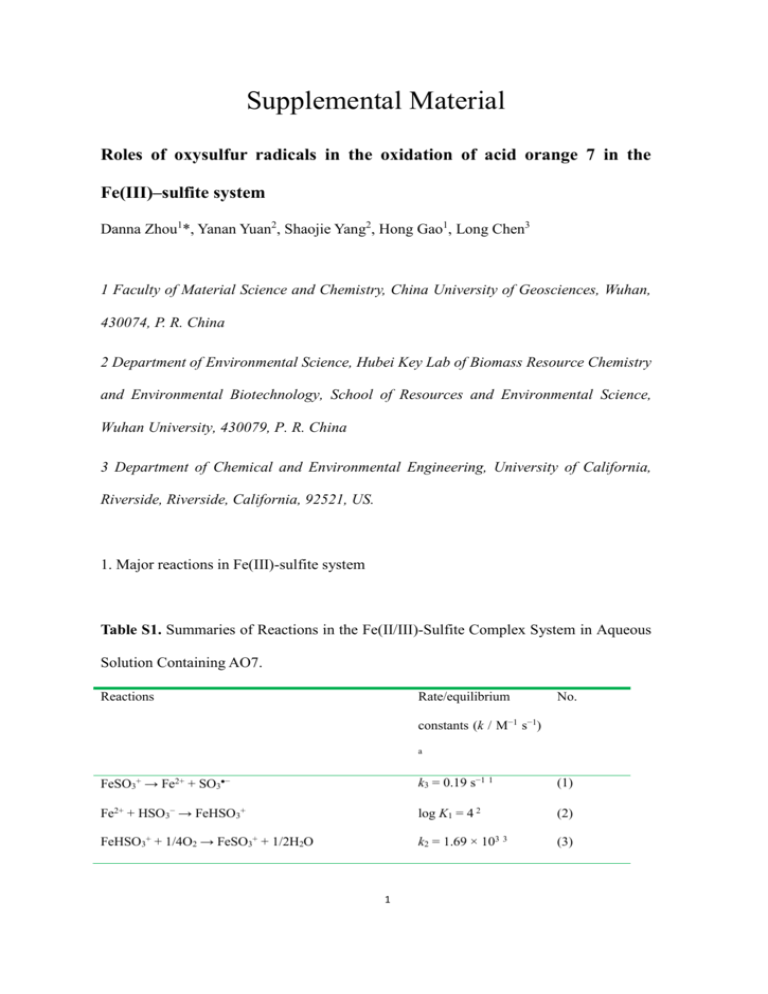
Supplemental Material Roles of oxysulfur radicals in the oxidation of acid orange 7 in the Fe(III)–sulfite system Danna Zhou1*, Yanan Yuan2, Shaojie Yang2, Hong Gao1, Long Chen3 1 Faculty of Material Science and Chemistry, China University of Geosciences, Wuhan, 430074, P. R. China 2 Department of Environmental Science, Hubei Key Lab of Biomass Resource Chemistry and Environmental Biotechnology, School of Resources and Environmental Science, Wuhan University, 430079, P. R. China 3 Department of Chemical and Environmental Engineering, University of California, Riverside, Riverside, California, 92521, US. 1. Major reactions in Fe(III)-sulfite system Table S1. Summaries of Reactions in the Fe(II/III)-Sulfite Complex System in Aqueous Solution Containing AO7. Reactions Rate/equilibrium No. constants (k / M−1 s−1) a FeSO3+ → Fe2+ + SO3− k3 = 0.19 s−1 1 (1) Fe2+ + HSO3− → FeHSO3+ log K1 = 4 2 (2) FeHSO3+ + 1/4O2 → FeSO3+ + 1/2H2O k2 = 1.69 × 103 3 (3) 1 SO3− + O2 → SO5− 1–2.3 × 109 4-7 (4) SO5− + HSO3− → SO3− + HSO5− ≤ 3 × 105 8 (5) SO5− + HSO3− → SO42− + SO4− + H+ ~1.2 × 104 9 (6) HSO3− + SO4− → SO42− + H+ + SO3− 7.5 × 108 10 (7) SO4− + H2O → SO42− + HO + H+ 6.6 × 102 s-1 11 (8) SO4− + OH- → SO42− + HO 1.4 × 107 11 (8) HO + AO7 → Product w 1.2 × 1010 12 (9) SO4− + AO7 → Product x 8.07 × 109 13 (10) SO5− + AO7 → Product y 1.2 × 107 b (11) SO3− + AO7 → Product z 2.1 × 106 b (12) a Second order rate constants are given unless otherwise indicated. b This work. 2. Experimental set-up Mixture of the dye, sulfite, and other probes Pipettor Fe(III) solution Deuterium Tungsten lamp Halogen lamp CCD detector Quartz cuvette Light source Optical fiber Magnetic stirr Optical fiber spectrometer system Working station Scheme S1. Diagram of reaction set-up with optical fiber spectrometer system as on-line analysis equipment. 2 3. Variations of dissolved oxygen DO detection was made with a DO meter (Hach, USA) in a 200-ml beaker containing all the reactants at the same concentrations as that in micro reaction system. -1 DO (mg L ) Variation of DO changes during reactions are shown in Fig. S1. 7 6 5 4 3 2 1 0 -1 Fe(II) Fe(III) 0 5 10 15 20 time (min) Figure S1. Variations of dissolved oxygen in the Fe(III)/Fe(II)-sulfite systems during oxidation of AO7 at pH 3. Initial Conditions: [Fe(III)]0 = 0.1 mM, [Fe(II)]0 = 0.1 mM, [Na2SO3]0 = 1.0 mM. [AO7]0 = 0.029 mM. 4. Reactions of AO7 at different initial concentrations 3 [AO7]0 mM 0.0058 0.015 0.029 0.044 0.058 0.06 0.05 C (mM) 0.04 0.03 0.02 0.01 0.00 0 5 10 15 20 time (min) Figure S2. Oxidation of AO7 at different initial concentration of AO7 ([AO7]0) in the Fe(III)-sulfite system at pH 3. The initial concentrations of AO7 were 0, 0.0058, 0.014, 0.029, 0.044 and 0.058 mM respectively. Initial Conditions: [Fe(III)]0 = 0.1 mM, [Na2SO3]0 = 1.0 mM. k = 0.09941 min-1 = 1.66 × 10-3 s-1. k = 0.07574 min-1 = 1.26 × 10-3 s-1. 5. Inhibition of oxidation by EtOH 4 1.0 0.8 C/C0 0.6 0.4 [EtOH]0 / [AO7]0 0.2 0.0 2 0; 4 10 ; 0 5 3 10 ; 5 10 ; 10 ; 5 4.5x10 10 15 20 time (min) Figure S3. Effect of EtOH on the oxidation of AO7 in the Fe(III)-sulfite system at pH 3. The initial concentrations of EtOH were 0, 2.9, 29, 290, 2900 and 13100 mM respectively. Initial Conditions: [Fe(III)]0 = 0.1 mM, [Na2SO3]0 = 1.0 mM, [AO7]0 = 0.029 mM. 6. Inhibition of oxidation by TBA 5 1.0 0.8 C/C0 0.6 0.4 [TBA]0/ [AO7]0 0.2 0.0 0; 4 2x10 ; 0 3 4 2x10 ; 10 ; 4 5 5x10 ; 10 5 10 15 20 time (min) Figure S4. Effect of TBA on the oxidation of AO7 in the Fe(III)-sulfite system at pH 3. The initial concentrations of TBA were 0, 2.9, 29, 58, 290, 580, 1450 and 2900 mM respectively. Initial Conditions: [Fe(III)]0 = 0.1 mM, [Na2SO3]0 = 1.0 mM, [AO7]0 = 0.029 mM. 7. Inhibition of oxidation by aniline 6 1.0 0.8 C/C0 0.6 0.4 [Aniline]0/ [AO7]0 0; 10; 0.2 0.0 0 5 10 100 15 20 time (min) Figure S5. Effect of aniline on the oxidation of AO7 in the Fe(III)-sulfite system at pH 3. The initial concentrations of aniline were 0, 0.29, and 2.9 mM respectively. Initial Conditions: [Fe(III)]0 = 0.1 mM, [Na2SO3]0 = 1.0 mM, [AO7]0 = 0.029 mM. 8. Inhibition of oxidation by diphenylamine 1.0 0.8 C/C0 0.6 0.4 [Diphenylamine]0/ [AO7]0 0; 1; 10 0.2 0.0 0 5 10 15 20 time (min) Figure S6. Effect of diphenylamine on the oxidation of AO7 in the Fe(III)-sulfite system 7 at pH 3. The initial concentrations of diphenylamine were 0, 0.029, and 0.29 mM respectively. Initial Conditions: [Fe(III)]0 = 0.1 mM, [Na2SO3]0 = 1.0 mM, [AO7]0 = 0.029 mM. 9. Inhibition of oxidation by PA in the absence of 1-hextanol 1.0 C/C0 0.8 0.6 0.4 [PA]0/ [AO7]0 0; 20; 0.2 0.0 0 5 1; 40 10 10 15 20 time (min) Figure S7. Effect of PA ((1,2,3-C6H3(OH)3)) on the oxidation of AO7 in the Fe(III)-sulfite system at pH 3. The initial concentrations of PA were over the range of 1 ~ 40 × [AO7]0. Initial Conditions: [Fe(III)]0 = 0.1 mM, [Na2SO3]0 = 1.0 mM, [AO7]0 = 0.029 mM. 10. Inhibition of oxidation by PA in the presence of 1-hextanol 8 1.0 0.8 C/C0 0.6 0.4 [PA]0/ [AO7]0 without 1-hexanol; 1; 5; 10 0.2 0.0 0 5 10 15 0; 20 time (min) Figure S8. Effect of PA ((1,2,3-C6H3(OH)3)) on the oxidation of AO7 in the Fe(III)-sulfite system in the presence of 1-hexanol at pH 3. The initial concentrations of PA were over the range of 1 ~ 10 × [AO7]0. Initial Conditions: [Fe(III)]0 = 0.1 mM, [Na2SO3]0 = 1.0 mM, [AO7]0 = 0.029 mM, [1-hexanol]0 = 29 mM. 11. Oxidation of AO7 in the absence of DO 9 1.0 0.8 C/C0 0.6 0.4 N2 Air 0.2 0.0 0 5 10 15 20 time (min) Figure S9. Comparison of the oxidation of AO7 in the Fe(III)-sulfite system at pH 3 in the presence of and absence of oxygen (N2 bubble). Initial Conditions: [Fe(III)]0 = 0.1 mM, [Na2SO3]0 = 1.0 mM, [AO7]0 = 0.029 mM. kobs, N2 = 0.0812 min-1 (0-2 min). 12. Inhibition of oxidation by PA in the absence of DO 10 [PA]0/[AO7]0 0.1 0.5 2 4 1.00 C/C0 0.98 0.96 0.94 0.92 0.90 0 5 10 15 20 time (min) Figure S10. Effect of PA ((1,2,3-C6H3(OH)3)) on the oxidation of AO7 in the Fe(III)-sulfite system in the absence of DO at pH 3. The initial [PA]0/[AO7]0 were 0.1, 0.5, 2 and 4 respectively. Initial Conditions: [Fe(III)]0 = 0.1 mM, [Na2SO3]0 = 1.0 mM, [AO7]0 = 0.029 mM, N2 bubbling for 20 min. 13. Estimation of the quasi steady-state concentrations of oxysulfur radicals In the Fe(III)-sulfite system, [SO4-]ss and [SO5-]ss in the presence of DO and [SO3-]ss in the absence of DO are calculated as follows: [𝑆𝑂4− ]𝑠𝑠 = 𝑘𝑜𝑏𝑠,𝑆𝑂4− (0.1506 − 0.0646)/60 = = 1.78 × 10−13 𝑀 9 − 𝑘𝑆𝑂4 ,𝑆 8.07 × 10 [𝑆𝑂5− ]𝑠𝑠 = [𝑆𝑂3− ]𝑠𝑠 = 𝑘𝑜𝑏𝑠,𝑆𝑂5− 𝑘𝑆𝑂5−,𝑆 = 0.0646/60 = 5.13 × 10−10 𝑀 2.1 × 106 𝑘𝑜𝑏𝑠,𝑆𝑂3− 0.0812/60 = = 1.13 × 10−10 𝑀 𝑘𝑆𝑂3−,𝑆 1.2 × 107 11 References [1] Buxton GV, Greenstock CL, Helman WP, Ross AB. Critical review of rate constants for reactions of hydrated electrons, hydrogen atoms and hydroxyl radicals (OH/O-) in aqueous solution. J Phys Chem Ref Data. 1988; 17: 513-886. [2] Zhang Y, Zhou J, Guo S, Wang G. Reaction kinetics and mechanism of iron(II)-induced catalytic oxidation of sulfur(IV) during wet desulfurization. Ind Eng Chem Res. 2012; 51: 1158-1165. [3] Grgić I, Poznič M, Bizjak M. S(IV) Autoxidation in atmospheric liquid water: The role of Fe(II) and the effect of oxalate. J Atmos Chem. 1999; 33: 89-102. [4] Buxton GV, Salmon GA, Wood ND. A pulse radiolysis study of the chemistry of oxysulfur radicals in aqueous solution. Phys Chem Behav Atmos Pollut. 1990; 245-250. [5] Hayon E, Treinin A, Wilf J. Electronic spectra, photochemistry, and autoxidation mechanism of the sulfite-bisulfite-pyrosulfite systems. The SO2-, SO3-, SO4-, and SO5- radicals. J Am Chem Soc. 1972; 94: 47-57. [6] Huie RE, Neta P. Chemical behavior of SO3- and SO5- radicals in aqueous solutions. J Phys Chem. 1984; 88: 5665-5669. [7] Huie RE, Clifton CL, Altstein N. A pulse radiolysis and flash photolysis study of the radicals SO2-, SO3-, SO4- and SO5-. Radiat Phys Chem. 1989; 33: 361-370. [8] Huie RE, Neta P. Rate constants for some oxidations of S(IV) by radicals in aqueous solutions. Atmos Environ. 1987; 21: 1743-1747. [9] Warneck P, Ziajka J. Reaction mechanism of the iron(III)-catalyzed autoxidation of bisulfite in aqueous solution: Steady state description for benzene as radical scavenger, Berichte der Bunsen-Gesellschaft für. Phys Chem. 1995; 99: 59-65. 12 [10] Wine PH, Tang Y, Thorn RP, Wells JR, Davis DD. Kinetics of aqueous phase reactions of the SO4- radical with potential importance in cloud chemistry. J Geophy Res D Atmos. 1989; 94: 1085-1094. [11] Herrmann H, Reese A, Zellner R. Time-resolved UV/VIS diode array absorption spectroscopy of SOx- (x = 3, 4, 5) radical anions in aqueous solution. J Mol Struct. 1995; 348: 183-186. [12] Özcan A, Oturan MA, Oturan N, Şahin Y. Removal of acid orange 7 from water by electrochemically generated Fenton's reagent. J Hazard Mater. 2009; 163: 1213-1220. [13] Zhou DN, Chen L, Zhang C, Yu YT, Zhang L, Wu F. A novel photochemical system of ferrous sulfite complex: Kinetics and mechanisms of rapid decolorization of Acid Orange 7 in aqueous solutions. 2014; 57: 87-95. 13
